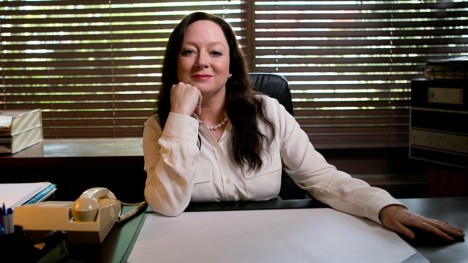House of Hancock case has implications for real life based drama producers, say academics
Billionaire mining magnate Gina Rinehart’s last minute legal push to edit the contents of a fictionalised portrayal of her relationship her life could have serious consequences for makers of non fiction based drama, say media law experts.
Last Friday afternoon Rinehart took Channel Nine to court to gain access to the final episode of the series House of Hancock, reaching a confidential agreement with the network on Saturday which saw edits made to the second episode before it aired on Sunday night. The court heard that as part of the deal Nine agreed to broadcast a line at the start of the show about it being a “fictionalised” drama.
Journalism academic Mark Pearson, said the case raises concerns defamation actions could be used to stifle production of local content based on living persons, and said the case could have an impact on how producers choose to tell stories like the fictionalised House of Hancock.



” … defamation actions could be used to stifle production of local content based on living persons.” The flip side of that argument is that production companies should be free to say whatever they want about whomever they want, without fear of retribution.
That’s just silly.
Given how much of this particular story appears “fictionalised” or to use the correct term MADE UP, Im not surprised that Reinhardt went for the producers etc.
If you are going to present a “real story” and sell it to the public as being based in fact, It seems only fair you should at least try to get it accurate.
I didnt bother watching the 2nd week as it became obvious that most of the story so far was impossible to check the truth, so many times the characters were talking between only 2 people, and if those people were not a part of the filming, then we are AT BEST guessing what was said.
Now, if only the newspapers and 7/9/10 news would brand themselves “fictionalised” we might be able to judge it for what it is.
Yes I agree, I’m sure if anyone has a story about themselves they would only want the truth told.
The mind boggles when this absolute crap is “popular”. Where are we headed?
If they can’t even wait till she’s dead to cash in on her life story then they are kind of asking for it. If they had some journalistic integrity to fall back on then I might feel sorry for them but they probably did make half of the shit up.
Too much money,too much time.GinA has been betreyed as an evil person.Was there consent?
The people concerned in this fiction are alive and well. Be careful when you make things up for no other reason than to make yourself some money, be very careful indeed because what goes round comes round. Channel nine not the best you can do.
It seems incredible to me that Channel 9 could fail to read the scripts with a magnifying glass before going into production. “Docu-Drama” is a meaningless term and in some ways it is contradictory. It’s only common sense that if you write controversial dialogue between two characters and it’s based on invention, you’re looking for trouble which might lead you to the courts..